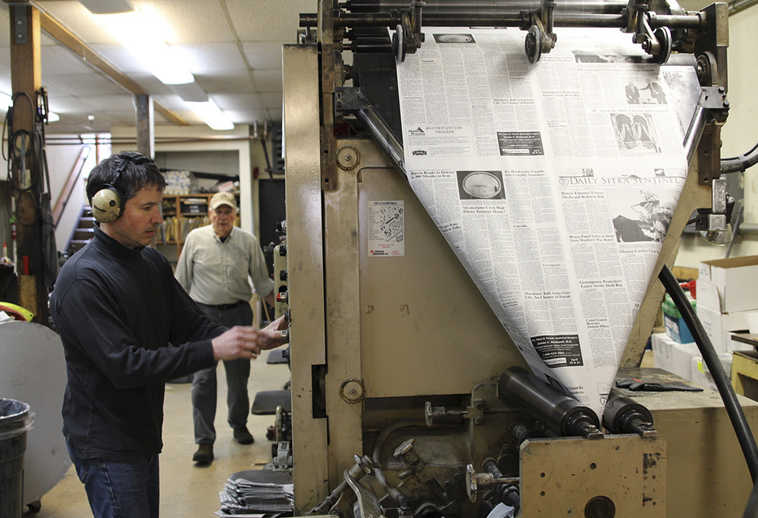SITKA (AP) — The Sitka Sentinel celebrated its 75th anniversary last year without much fanfare. As many newspapers in big cities have folded or turned into online only operations, the Sentinel steadily churns out five issues a week.
The paper is owned and edited by Thad and Sandy Poulson, reporters who arrived in 1969 and are determined to keep the press running.
“Come on back, there’s something kind of interesting,” Thad Poulson said, winding his way through the print shop.
On our right is a giant orange machine — a printing press that was state of the art when Poulson arrived in 1969 — and continues to churn out every issue of the paper to this day. But that’s not what Poulson is excited about. He motions to the back room, his fingers covered with ink.
“Things are kind of inky back here, so be careful not to touch things,” Thad said.
Before us is their brand new CTP machine, which stands for computer-to-plate. The plate works like a rubber stamp — getting covered with ink and smooshed by the press onto large banks of paper. But instead of rubber, it’s a giant square of aluminum.
“So it’s going to emerge fully developed within three minutes,” Thad said, feeding the plate into the machine. “There it goes!”
Lasers will etch the words and images of the front page onto the plate’s surface. There’s a story about a Coast Guard rescue and Medicaid reform. The lead photo is of a little boy getting his head shaved for St. Baldrick’s, a cancer fundraising event. Transferring his face onto the front page would have been a three step process before, involving cutting and pasting and a lot of manual labor. With the CTP machine, that imaging process is entirely digital.
“This thing takes an hour at least an hour of the production process,” Thad said.
The Sentinel’s first editor was Harold Veatch in 1939. Alaska wasn’t yet a state. Franklin Delano Roosevelt was president. And the reason the paper’s still around — surviving the digital revolution and the folding of papers around the country — is through the steady devotion of one newspaper couple, Thad and Sandy Poulson. They have been working at the paper since 1969.
“It’s all we know how to do. We talk about that sometimes. What if we weren’t here? What if we had something? Well, what else can we do?” Thad said. “This is the path we’ve charted for ourselves, so here we are.”
And the Sentinel really is a family production. Thad and Sandy co-edit. They met while working at papers in Oklahoma City. He’s 79 and she’s 75. Their son James Poulson takes all the pictures. There are two general assignment reporters and a handful of additional staff members. In addition to copy editing all the content, Thad runs the press in the basement, just as he did when he was 36.
As issues arrive hot off the press, he flicks them to check for ink spots and clear jams.
As for Thad’s wife Sandy?
“She’s the quarterback of the team,” Thad said. “She decides what’s going to be on the front page and chooses the right stories and writes the headlines.”
Nowadays, Sandy culls national stories from The Associated Press with a few clicks of the mouse. But in the beginning, she was tethered to news of the world through a single wire service that typed at 60 words a minute.
“DEDDEDEDDDEDE — except five times louder,” James Poulson said. He was four years old when his parents took over the paper, called growing up in a 1970s newsroom “tumultuous.”
“When there’s an important breaking story, a bell would go off and I just remember when I was a kid, the bell would go off quite a bit because it was during Watergate,” James said. “Lots of breaking news.”
James says his parents have tried their best to keep up with technology over the years.
“Dad is kind of an early adopter,” James said. “He was sending out e-mails back when it was like sending out Morse code.”
But that doesn’t mean that it’s been easy to adapt. The CTP machine cost $50,000, which is why it took the Sentinel so long to incorporate it. But the paper is profitable. That’s partly because the operation is mostly a family affair.
“I wouldn’t recommend it for a business model and I’ll tell you why,” Thad said. “What if we want to move on? Do something else? Transfer ownership? The salaries we’ve been paying ourselves on the books won’t cover half of what you have to pay the people who will do it in real life.”
Thad and Sandy met working for city papers in Oklahoma, but had to change their approach to reporting in Sitka. This is especially true with the obituaries, which Sandy takes particular pains to write. She invites the family to weigh in in their own words.
“With age I realize more and more the importance of having some sort of legacy or having your life on record somewhere,” Sandy said.
It’s the kind of personal touch that only newspaper in a town of 9,000 can bring.
“We are a daily paper in a weekly sized town. It works very well for us, but it’s the exception rather than the rule.”
Within 20 minutes, the print is done. And 2,500 issues are stacked and ready for distribution. Thad looks over me a triumphant grin.
“Another day, another dollar!” he said.
Thad Poulson says circulation is double what it was in the 1970s and that as long as Sitkans still want a daily paper, he intends for the Sentinel to be around.


